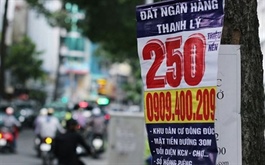Gaps closed thanks to credit law reforms
Gaps closed thanks to credit law reforms
Vietnam’s revised Law on Credit Institutions introduces broad reforms aimed at enhancing banking sector governance, transparency, and efficiency.

The National Assembly (NA) last week ratified the amended Law on Credit Institutions, a comprehensive legal framework encompassing 15 chapters and 210 articles, set to take effect from July.
This significant legislative overhaul aims to rectify longstanding gaps in the governance of the banking system, enhancing the safety and efficiency of credit and monetary operations.
“The amended law marks a decisive step in refining our financial system’s governance, ensuring a safer, more transparent, and effective framework,” said Dr. Can Van Luc, a member of the National Financial and Monetary Policy Advisory Council. “It’s a timely response and fills a critical legal gap in managing non-performing loans. The implementation of this law is imperative for ministries and local authorities.”
The legislation addresses the need to curb manipulative practices and affiliated dealings within the financial sector, focusing on risk control and protecting the interests of various stakeholders.
Experts consider the law to be comprehensive, and having a profound impact on financial and monetary policy, economic stability, and the banking system’s sustainability.
“This law is pivotal in aligning our banking practices with international norms and principles of a market-oriented socialist economy, enhancing competitiveness and reinforcing the banking sector’s role in the economy,” Dr. Luc said.
Key aspects of the reform include mitigating cross-ownership issues and preventing undue influence of banks.
Vu Hong Thanh, chair of the NA Economic Committee, emphasised the law’s focus on transparency. “Alongside measures to reduce shareholding ratios and limit credit issuance, the law introduces provisions for public disclosure of information. This move ensures that shareholders owning 1 per cent or more of a credit institution’s capital are held to a standard of transparency,” he said.
Tran Thi Khanh Hien, head of Research at MB Securities added, “Central to the reforms are measures addressing cross-ownership and control issues within credit institutions, insurance agency operations, and proactive strategies for managing weaker financial entities and their secured assets. These are expected to be the most influential factors on the operations of Vietnam’s listed banks.”
Tran Minh Hai, director of law firm Basico, noted the challenges banks might face due to these new provisions.
“The revised law introduces more stringent limits and administrative requirements for banks,” Hai said. “For instance, the restriction on credit provision has been tightened, reducing the loan limit to 10 per cent of a bank’s own capital per customer, down from the previous 15 per cent, and tightening the group customer loan limit from 25 per cent of own capital to 15 per cent.”
The real issue in banking violations has not been the ratios but the quality of credit and assets, Hai added, and the increased restrictions could potentially make it more challenging for banks to conduct business in the future.
The amendments to the law are part of a broader initiative to enhance governance and operational transparency in banks, aiming to curb the influence of large shareholders and other manipulative practices. The law introduces regulations to reduce the shareholding ratio of institutional shareholders and groups, along with a phased reduction in credit limits.
In addition to these restrictions, the law revises the definition of related persons and mandates information disclosure for shareholders owning at least 1 per cent of a credit institution’s charter capital. It also updates standards for management and executive roles, emphasising the independence and expertise of board members.
Director of law firm ANVI, Truong Thanh Duc, said, “The integration of establishment and operation licences with the business registration certificate is in line with government efforts to reduce bureaucratic hurdles, supporting business activities.”
Furthermore, the law introduces a prohibition on such institutions and their personnel from linking non-mandatory insurance product sales with banking services. “This regulation is set to reduce consumer risks and limit unfair practices in the sector,” Duc said.




























